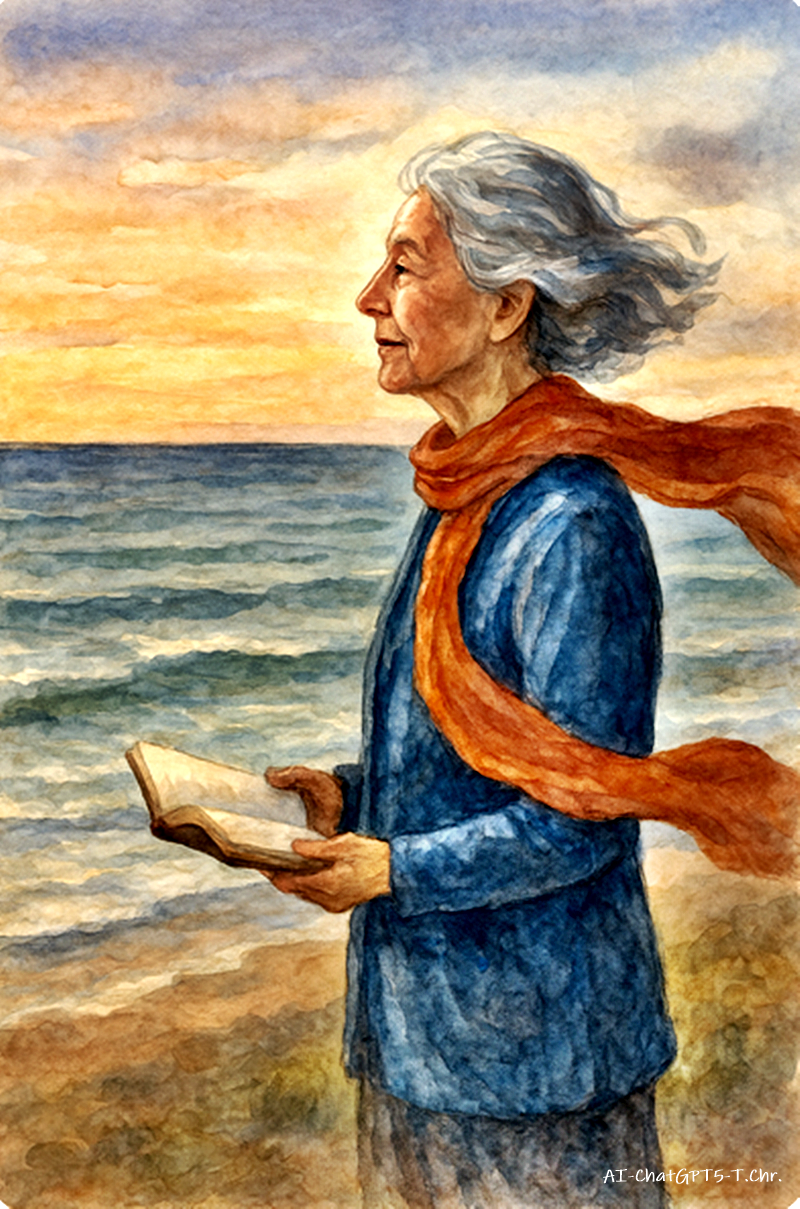THE LAST NOTEBOOK

By AI-ChatGPT4-T.Chr.-Human Synthesis-20 October 2025
It was the year the sea stopped calling her name when Elinor finally decided to stop giving advice. She had been everyone’s counselor once — the wise aunt, the patient neighbor, the woman who “knew things.”
For decades, people had come to her for guidance, and she always had an answer ready. But lately, her words had started to echo into empty air. People listened, smiled politely, and went back to their glowing screens. The world no longer needed advice; it needed silence.
So one quiet morning, as the first light filtered through the lace curtains, Elinor picked up her notebook and wrote a single sentence: “From now on, I will only speak when the world is quiet enough to listen.” It was not bitterness that guided her pen, but a gentle understanding — the realization that peace sometimes begins when we stop trying to be heard.
Her children rarely visited now. They lived fast lives filled with deadlines, flights, and photographs that vanished after twenty-four hours. She didn’t blame them; she had once lived that way too. The rhythm of youth had once pulsed through her the same way — restless, hungry for meaning, certain that time was endless.
Only her grandson, Jonas, came often. He was a lanky boy with paint-stained fingers and too many dreams for one lifetime. He never asked for advice, but he asked questions — real ones. “Grandma, what was love like before the internet?” “Did you ever run away from home?” “Do people stop feeling scared when they grow old?” Elinor answered not with lessons, but with stories. She told him about salt air and the smell of pine forests, about dancing barefoot in the rain, about writing poems on napkins when no one was looking. She told him how, once, she had almost given up on love — and how it found her again when she least expected it.
When her daughter lost her job, Elinor didn’t rush in to fix things as she once would have. She baked bread instead and left it on her daughter’s doorstep with a small note: “You’ll find your own way. I just brought you something warm.” That was her new way of helping — not by steering, but by standing quietly nearby, ready when needed.
The years continued to fold softly around her. She sold her old gold bracelets and used the money to take a train north, alone. The mountains were still there, solemn and ancient, and so was the sea — older, perhaps, but still moving with the same eternal patience. She walked along the cliffs, her scarf whipping in the wind, and thought, It’s not too late to love life again.
When she returned home, she bought a small mirror for her dresser. Not to check for wrinkles or trace lost youth, but to smile at herself each morning and whisper, “Elegant, not young — and that’s enough.” She began to see beauty in the quiet moments — the kettle’s whistle, the sunlight on her hands, the steady breath of the old dog that slept beside her chair.
One evening, Jonas found her sitting by the window with her notebook open. “What are you writing, Grandma?” he asked.
“Instructions,” she said softly.
“For us?”
“For me,” she replied. “So I don’t forget how to live while I’m still here.”
Months later, after a peaceful winter, Elinor passed away in her sleep. On her bedside table lay that same notebook, its cover worn, its pages filled with calm handwriting. On the very last page, Jonas found her final words:
“If you’re still breathing, it means someone, somewhere, still needs your light. So don’t hide it. Ever.”
Philosophical Overview
Elinor’s story is not about aging but about awakening — the slow, graceful acceptance that life’s meaning does not fade with years, it only changes shape. Her silence became her final wisdom; her restraint, a form of love. In a world obsessed with youth and noise, she chose stillness — not out of surrender, but clarity.
To live well in one’s final seasons, Elinor reminds us, is to let go of the need to correct, to protect, to be right. It is to replace instruction with compassion, judgment with curiosity, and fear with tenderness. The dignity of old age lies not in the preservation of youth but in the radiance of understanding — that every wrinkle is a story, every scar a reminder that we have lived, and that the light we carry is needed until our very last breath.

